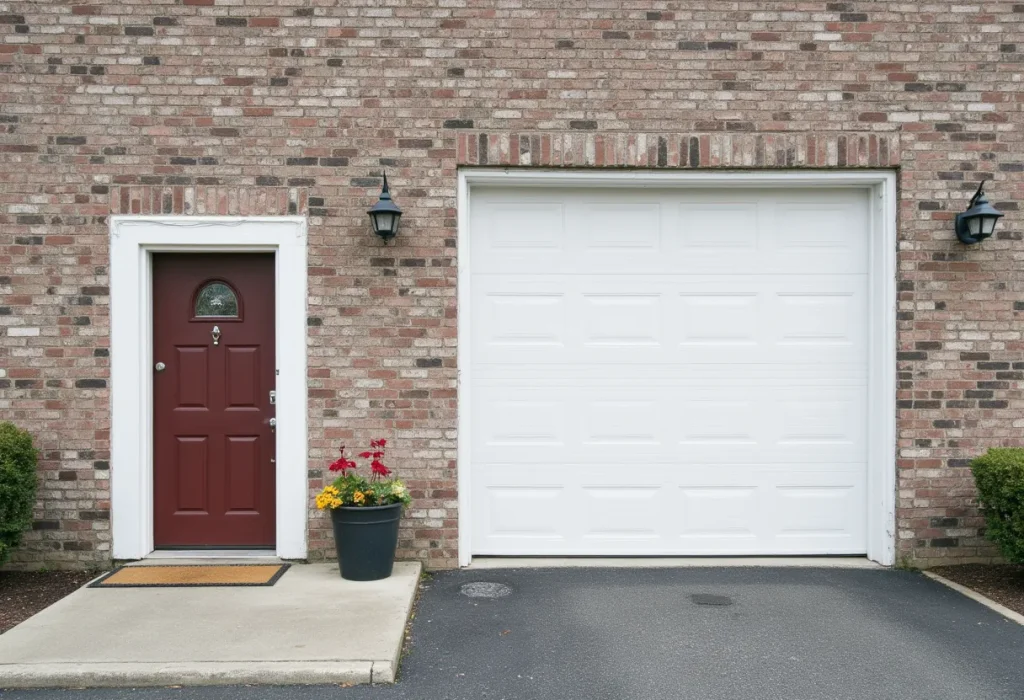Insulated vs Non-Insulated Doors
Insulated vs Non Insulated Garage Doors: Which Is Right for You?
When choosing between insulated and non-insulated garage doors, homeowners face important differences. Insulated doors provide better energy efficiency, temperature control, and noise reduction, while non-insulated options are often more budget-friendly. This article explores the key factors influencing the decision, including materials, construction, durability, and how each type impacts overall comfort and energy costs. The insights will help homeowners make an informed choice for their garage needs.

Differences Between Insulated and Non-Insulated Garage Doors
Understanding the differences between insulated and non-insulated garage doors is crucial for homeowners to make informed choices. The materials, construction methods, and overall durability can significantly impact the functionality and efficiency of these doors.
Materials Used in Insulated vs Non-Insulated Doors
Insulated garage doors are typically made from multiple layers of materials. Commonly, they include a combination of steel or wood with a layer of insulation in between. Conversely, non-insulated doors consist of a single layer of steel or wood, providing minimal thermal resistance.
Construction and Layers Explained
Insulated doors feature a more complex construction, integrating insulation between panels. This multi-layered approach helps to regulate temperature effectively. Non-insulated doors lack this feature and are often thinner, resulting in greater heat transfer.
Types of Insulation: Polystyrene vs Polyurethane
- PolystyreneThis insulation type is applied as sheets attached to the door’s surface. It provides decent thermal resistance for various climates.
- PolyurethaneThis method injects insulation, creating a solid barrier within the door. It typically offers better R-value, enhancing energy efficiency.
Impact on Garage Door Durability
Insulated doors generally exhibit greater durability due to their robust construction. The added layers not only contribute to thermal regulation but also enhance the door’s resistance to dings and dents. In contrast, non-insulated models may show wear and tear more quickly due to their thinner design.
Energy Efficiency and Temperature Control
Energy efficiency and effective temperature control are crucial factors when selecting garage doors. The right choice can result in significant savings and improved comfort throughout the year.
How Insulated Doors Save on Heating and Cooling Costs
Insulated garage doors contribute to lower heating and cooling expenses by minimizing temperature exchange between the garage and the outside environment. The insulation works as a barrier, decreasing the workload on heating and cooling systems. As a result, homeowners can experience reduced energy bills over time.
Temperature Regulation in Year-Round Climates
In areas with fluctuating climates, insulated doors help maintain consistent internal temperatures, irrespective of external conditions. This stability is essential for families that use their garages for various purposes, including as workspaces or storage for temperature-sensitive items.
Effect on the Temperature Inside Your Garage and Adjacent Rooms
Temperature fluctuations in the garage can influence the comfort of adjacent living spaces. Insulated doors mitigate extreme temperature changes, helping to extend the overall comfort of the home. This is particularly beneficial for homes with attached garages, where temperature control can affect indoor living areas.
Insulated Doors for Extreme Temperatures in South Florida Context
In regions like South Florida, where both summer heat and winter cool breezes can be intense, insulated garage doors are especially valuable. They help keep garages cooler during sweltering summer months, creating a more comfortable environment for anyone accessing the space. The insulation also aids in managing cooler temperatures during the occasional winter cold snaps.
Noise Reduction and Comfort Benefits
Insulated garage doors offer significant advantages in noise reduction and comfort. They create a quieter environment, making them ideal for homes where peace is a priority.
Noise Dampening Properties of Insulated Garage Doors
The design of insulated garage doors includes multiple layers, which work together to absorb sound. This multilayer construct significantly minimizes noise from outside, providing a more serene atmosphere inside the garage. The insulation material effectively dampens vibrations and reduces overall sound transmission.
Reducing Vibrations and Sound Transmission in Residential Garages
Insulated doors excel in reducing vibrations caused by external factors such as traffic or weather. This is particularly beneficial in residential settings where garages are often adjacent to living spaces. The enhanced soundproofing ensures that activities in the garage do not disturb family members relaxing at home.
Comparing Noise Levels: Non-Insulated Doors vs Insulated Doors
When comparing noise levels, non-insulated garage doors typically allow more sound to pass through due to their single-layer construction. Insulated options, on the other hand, offer superior sound dampening, resulting in a quieter experience. Homeowners will notice a stark contrast in noise reduction capabilities, particularly in homes located in busy areas or near roads.
Style, Design Options, and Curb Appeal
A garage door significantly influences a home’s overall style and curb appeal. With a wide range of design options available, choosing the right garage door can enhance the aesthetic value of any property.
Modern Garage Doors: Insulated Designs and Finishes
Contemporary insulated garage doors often feature sleek lines and minimalist designs. Available in various finishes, such as matte, gloss, and wood grain, these doors can complement modern architectural styles while providing energy efficiency.
Traditional and Carriage House Doors Insulation Options
For homeowners who prefer a classic look, traditional and carriage house doors are popular choices. Many of these doors are designed with insulation built-in, allowing for a blend of timeless aesthetics and modern functionality.
Customization and Decorative Elements for Insulated Doors
- Customizable colors and textures
- Decorative hardware options
- Glass panels for enhanced natural light
Customization options allow homeowners to tailor their insulated garage doors to their unique stylistic preferences, ensuring a perfect fit within the broader design of their home.
Impact of Insulation on Garage Door Aesthetics
Insulated garage doors often feature better overall aesthetics compared to their non-insulated counterparts. The added layers of material can create a more polished look while contributing to the door’s durability. The insulation allows for more intricate design details, further enhancing curb appeal.
Practical Considerations for Choosing Your Garage Door
Selecting the right garage door encompasses various practical factors that impact not only functionality but also long-term satisfaction. Understanding these elements can aid in making an informed decision that fits individual needs.
Budget: Upfront Cost vs Long-Term Savings
The initial investment in a garage door can vary significantly depending on insulation and materials. Insulated doors often come with a higher upfront cost but can lead to substantial savings over time:
- Lower energy bills due to improved temperature regulation.
- Increased durability can result in fewer repair expenses.
Assessing the total cost of ownership is essential for making a financially sound choice over the life of the door.
Residential Garage Door Needs vs Commercial Applications
Home garage doors and those used for commercial purposes serve different needs. Residential options typically prioritize aesthetics and energy efficiency. Conversely, commercial doors can focus more on durability and functionality:
- Residential applications benefit from customizable designs.
- Commercial settings require robust doors to withstand heavy usage.
Understanding these distinctions assists in selecting the right door based on intended use.
Garage Usage: Workspace, Storage, or Vehicle Shelter
The function of the garage greatly influences the choice of door. For garages used as:
- Workspaces: Insulated doors enhance comfort and reduce noise.
- Storage: Protects temperature-sensitive items from extreme temperatures.
- Vehicle shelter: Ensures the interior remains functional throughout different seasons.
Attached Garage vs Detached Garage: Insulation Importance
Insulated garage doors become increasingly important for attached garages that connect to living spaces. They help maintain a stable temperature in adjacent rooms:
- Detached garages may not require advanced insulation.
- Insulation serves as an energy buffer for homes with attached models.
Understanding the insulation needs based on garage type can significantly enhance overall home comfort.
Installation and Maintenance Insights
Understanding the installation and maintenance of garage doors is essential for long-term performance. This section covers the vital aspects of working with local technicians and ensuring compatibility and upkeep of insulated doors.
Working with Local Dealers and Technicians in Miami-Dade and Monroe County
Selecting qualified professionals within Miami-Dade and Monroe County is vital for installation and maintenance. Local experts are familiar with the specific garage door systems prevalent in South Florida homes, ensuring they understand regional building codes and requirements.
Garage Door System Compatibility with Insulation
When considering insulation, it’s essential to evaluate the compatibility of the existing garage door system. Factors to assess include:
- Door type and material
- Weight and balance considerations
- Opener capacity to handle added weight
Repair and Replacement Tips for Insulated Garage Doors
Over time, insulated garage doors may require repairs. Key tips include:
- Regularly inspect seals and frames for wear
- Address any dents or damage promptly to maintain insulation integrity
- Consult professionals for effective repair solutions
Maintaining Door Insulation and Weather Seals
Proper maintenance extends the lifespan of insulated garage doors. To ensure maximum efficiency:
- Clean weather seals regularly to prevent debris buildup
- Check seals for cracks and replace as needed
- Perform seasonal inspections to identify potential insulation issues
Compliance and Safety Considerations
Adhering to safety standards and local regulations is crucial when selecting a garage door. Various factors can impact compliance, particularly in regions exposed to severe weather conditions, such as South Florida.
Meeting HVHZ and Wind-Load Requirements for South Florida Homes
In South Florida, garage doors must meet High-Velocity Hurricane Zone (HVHZ) standards to withstand strong winds and storm conditions. This requirement ensures that doors can safely function during hurricanes and storms, minimizing damage risk to both property and occupants. Key considerations include:
- Materials that are resilient to high wind pressure.
- Designs that have been tested and approved for compliance.
- Installation methods that adhere to local building codes.
Fire Doors and Insulation Standards
Fire safety regulations mandate specific standards for garage doors that serve as fire barriers between living spaces and garages. Insulated doors must meet these standards to minimize the spread of fire. Important aspects include:
- Door ratings defined by building codes.
- Material specifications that provide fire resistance.
- Sealing properties to prevent smoke infiltration.
Local Building Codes Affecting Garage Door Selection
Local building codes vary significantly and play a vital role in garage door selection. Homeowners should be aware of their local requirements, which may affect various factors such as:
- Permissible designs and materials.
- Specific insulation requirements for energy efficiency.
- Mandatory features for storm protection and safety.
Frequently Asked Questions About Insulated vs Non-Insulated Garage Doors
This section addresses common inquiries related to insulated and non-insulated garage doors, highlighting energy savings, noise reduction, durability, and overall value.
Will an Insulated Door Lower My Energy Bills?
Insulated garage doors can lead to significant savings on energy bills. By maintaining a more stable temperature inside the garage, these doors reduce the demand for heating and cooling systems in the home. Over time, homeowners often notice a decrease in total energy costs, especially in areas with extreme weather conditions.
Can Garage Door Insulation Reduce Noise From Outside?
Indeed, the insulation in garage doors plays a vital role in noise reduction. Insulated doors dampen sound transmission, making garages quieter. This feature is particularly beneficial for homes located near busy streets or in densely populated areas where external noise can be disruptive.
How Does Insulation Affect Door Durability and Lifespan?
Insulated garage doors typically offer enhanced durability compared to their non-insulated counterparts. The added layers of insulation contribute to structural integrity, making them more resistant to dents and damage. As a result, insulated doors often enjoy a longer lifespan and require less frequent maintenance.
Are Insulated Garage Doors Worth the Investment?
Investing in insulated garage doors generally proves worthwhile for homeowners. The initial higher cost is often offset by reduced energy expenses and increased comfort. Furthermore, the enhanced aesthetics, lower noise levels, and improved thermal performance add tangible value to the property over time.

